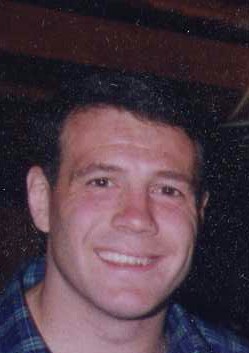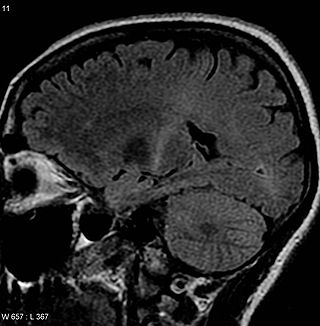Related Research Articles

Motor neuron diseases or motor neurone diseases (MNDs) are a group of rare neurodegenerative disorders that selectively affect motor neurons, the cells which control voluntary muscles of the body. They include amyotrophic lateral sclerosis (ALS), progressive bulbar palsy (PBP), pseudobulbar palsy, progressive muscular atrophy (PMA), primary lateral sclerosis (PLS), spinal muscular atrophy (SMA) and monomelic amyotrophy (MMA), as well as some rarer variants resembling ALS.

Scott Hastings is a Scottish sports commentator and former Scotland international rugby union player. At the point of his retiral, he was Scotland's most-capped player ever, but this record has now been beaten. He played for Edinburgh District and when that provincial side turned professional he played for Edinburgh Rugby. At amateur level he played for Watsonians.
George Wilson "Doddie" Weir was a Scottish rugby union player who played as a lock. He made 61 international appearances for the Scotland national team and represented the British & Irish Lions.

The Institute of Psychiatry, Psychology and Neuroscience (IoPPN) is a research institution dedicated to discovering what causes mental illness and diseases of the brain. In addition, its aim is to help identify new treatments for them and ways to prevent them in the first place. The IoPPN is a faculty of King's College London, England, previously known as the Institute of Psychiatry (IoP).

Progressive muscular atrophy (PMA), also called Duchenne–Aran disease and Duchenne–Aran muscular atrophy, is a disorder characterised by the degeneration of lower motor neurons, resulting in generalised, progressive loss of muscle function.
Mecasermin rinfabate, also known as rhIGF-1/rhIGFBP-3, is a drug consisting of recombinant human insulin-like growth factor 1 (IGF-1) and recombinant human insulin-like growth factor binding protein-3 (IGFBP-3) which is used for the treatment of amyotrophic lateral sclerosis.
Orla Hardiman is an Irish consultant neurologist. She was appointed Professor of Neurology by Trinity College University of Dublin in 2014, where she heads the Academic Unit of Neurology, housed in Trinity Biomedical Sciences Institute. She is a HRB Clinician Scientist and Consultant Neurologist at the National Neuroscience Center of Ireland at Beaumont Hospital, Dublin. She leads a team of 30 researchers focussing on clinical and translational aspects of amyotrophic lateral sclerosis and related neurodegenerations. Hardiman has become a prominent advocate for neurological patients in Ireland, and for patients within the Irish health system generally. She is co-Founder of the Neurological Alliance of Ireland, and Doctors Alliance for Better Public Healthcare. In the past, she established the bi-annual Diaspora Meeting, a forum for Irish neurologists based overseas to present and discuss their research findings with neurologists working in Ireland.

Amyotrophic lateral sclerosis (ALS), also known as motor neuron disease (MND) or Lou Gehrig's disease, is a neurodegenerative disease that results in the progressive loss of motor neurons that control voluntary muscles. ALS is the most common form of the motor neuron diseases. Early symptoms of ALS include stiff muscles, muscle twitches, and gradual increasing weakness and muscle wasting. Limb-onset ALS begins with weakness in the arms or legs, while bulbar-onset ALS begins with difficulty speaking or swallowing. Around half of people with ALS develop at least mild difficulties with thinking and behavior, and about 15% develop frontotemporal dementia. Motor neuron loss continues until the ability to eat, speak, move, and finally the ability to breathe is lost with the cause of early death usually being respiratory failure.
Ozanezumab is a monoclonal antibody designed for the treatment of ALS and multiple sclerosis.

Galidesivir is an antiviral drug, an adenosine analog. It was developed by BioCryst Pharmaceuticals with funding from NIAID, originally intended as a treatment for hepatitis C, but subsequently developed as a potential treatment for deadly filovirus infections such as Ebola virus disease and Marburg virus disease, as well as Zika virus. Currently, galidesivir is under phase 1 human trial in Brazil for coronavirus.
Thomas H. Bak is a Polish-British cognitive neuroscientist. He is a researcher at the University of Edinburgh whose work centres on the impact of bilingualism on cognitive functions, bilingualism and cognitive function across the lifespan, cross-linguistic studies of aphasia, and the relationship between language, cognition and culture in neurodegenerative brain diseases. He also works on the design and adaptation of cognitive and motor assessments to different languages and cultures.

Gordon Lewis Aikman BEM was a British political researcher and campaigner. He was Director of Research for the Better Together campaign during the Scottish Independence Referendum. During that campaign he was diagnosed with motor neurone disease. Aikman successfully lobbied the Scottish Government to double the number of MND nurses in Scotland, and to fund them via the NHS. He also raised more than £500,000 for medical research.

Euan MacDonald MBE is a Scottish entrepreneur. He studied at the University of St Andrews and the University of Edinburgh. MacDonald was diagnosed with Motor Neurone Disease (MND) in October 2003.
Dame Pamela Jean Shaw is a British consultant neurologist, and professor of neurology at the University of Sheffield. She is the founder and director of the Sheffield Institute for Translational Neuroscience (SITraN), and in 2019 was appointed to lead the National Institute for Health Research (NIHR) Sheffield Biomedical Research Centre.
Christopher Edward Dennistoun Shaw MBChB, MD, FRACP, FRCP (Hon), FMedSci, FANA is Professor of Neurology and Neurogenetics at the Institute of Psychiatry, Psychology and Neuroscience, King's College London. He is also Head of the Department of Basic and Clinical Neuroscience, Director of the Maurice Wohl Clinical Neuroscience Institute at King's College London and an Honorary Consultant Neurologist and Neurogeneticist at King's College Hospital. His major research interest is in the genetic, molecular and cellular basis of motor neuron diseases such as amyotrophic lateral sclerosis (ALS).
Justin John Yerbury is an Australian molecular biologist who was spurred to follow a career in biological research when he discovered his family has the genetic form of motor neuron disease (MND). He holds the position of Professor in Neurodegenerative Disease at the University of Wollongong. He was diagnosed with MND himself in 2016 but continues to research.
Catherine Abbott, Lady Bird is a professor of molecular genetics at the University of Edinburgh.
The Doddie Weir Cup is a perpetual rugby union trophy established in 2018 and contested between Scotland and Wales. The cup is named for former Scotland international lock Doddie Weir who died at 52 after suffering from motor neurone disease, and was created to raise awareness of the illness.
Gilles J. Guillemin is a French-Australian neuroscientist at Macquarie University. He received the Ordre national du Mérite in 2019 in recognition of his work in medical research. He was awarded a Member of the Order of Australia in 2021.
Ammar Al-Chalabi is Professor of Neurology and Complex Disease Genetics at the Maurice Wohl Clinical Neuroscience Institute at King's College London, where he is also head of the Department of Basic and Clinical Neuroscience and Director of the King's Motor Neuron Disease Research Centre. In 2020, he received the Forbes Norris Award from the International Alliance Of Als/Mnd Associations and was a co-winner of the Healey Center International Prize for Innovation in ALS. His other awards include the Sheila Essey Award from the American Academy of Neurology and the Charcot Young Investigator Award from the Motor Neurone Disease Association. In 2021 he was appointed Senior Investigator at the National Institute for Health Research (NIHR).
References
- ↑ "About The Euan MacDonald Centre for MND Research". The Euan MacDonald Centre. 20 March 2018. Retrieved 30 March 2021.
- ↑ Donnelly, Brian. "Hotel chain's founder gives cash for motor neurone centre". The Herald. Retrieved 15 September 2014.
- ↑ Swanson, Brian (27 June 2007). "Businessman's plight to save his son". Scottish Express. Retrieved 29 September 2014.
- ↑ "Motor neurone sufferer gives £1m to create research centre". The Scotsman. 4 October 2011. Retrieved 29 September 2014.
- ↑ "Edinburgh centre is world leader in research into disease". STV News. Retrieved 14 October 2014.
- ↑ "Joost van der Westhuizen in motor neurone disease research drive". BBC News. 15 November 2013. Retrieved 15 September 2014.
- ↑ "Zebrafish offer hope for treatment for motor neurone disease". The Telegraph. Archived from the original on 11 September 2009. Retrieved 15 September 2014.
- ↑ "Researchers use skin cells from MND patient to create motor neurones". News Medical. 27 March 2012. Retrieved 29 September 2014.
- ↑ McArdle, Helen. "Breakthrough discovery reveals way of reversing Motor Neurone Disease damage". The Herald. Retrieved 30 March 2021.
- ↑ Hughes, Dominic (15 January 2020). "MND: The search for new treatments". BBC News. Retrieved 30 March 2021.
- ↑ "'One of biggest' clinical drug trial for MND launched". ITV. 15 January 2020. Retrieved 30 March 2021.
- ↑ Mehta, Arpan R.; Pal, Suvankar; Chataway, Jeremy; Carpenter, James R.; Parmar, Mahesh K. B.; Chandran, Siddharthan (10 May 2022). "Smarter adaptive platform clinical trials in neurology: a showcase for UK innovation". Brain. 145 (8): e64–e65. doi:10.1093/brain/awac169. hdl: 20.500.11820/0bcf9f07-3ba8-4b8e-a234-1520f5de02bd . ISSN 0006-8950. PMID 35535817.
- ↑ Mehta, Arpan R; Chataway, Jeremy; Pal, Suvankar; Parmar, Mahesh K B; Chandran, Siddharthan (December 2021). "Trials for neurodegenerative diseases: time to innovate". The Lancet Neurology. 20 (12): 984. doi:10.1016/S1474-4422(21)00388-4. PMC 7612114 . PMID 34800413.
Coordinates: 55°55′19″N3°08′15″W / 55.9219°N 3.13756°W
